Description 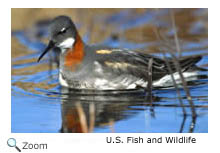 The red-necked phalarope is
a small shorebird that spends most of its time on the open ocean. It is 6-8 inches in length with a
14-15
inch wingspan.
It has a long, pointed black bill and long, black legs with lobed toes. The red-necked phalarope is
a small shorebird that spends most of its time on the open ocean. It is 6-8 inches in length with a
14-15
inch wingspan.
It has a long, pointed black bill and long, black legs with lobed toes.
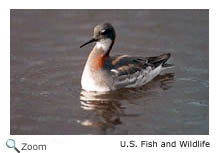 During breeding season, the female has a gray breast. Her back is dark gray and streaked with brown. She has a dark gray head, a white spot above her eyes, a dark red neck, and a white chin. The male has similar coloring, but he is a little duller in color and has a white line over his eyes. In non-breeding season, the red-necked phalarope is gray on its back and white on its belly. It has a white head and dark patches on the side of its face. During breeding season, the female has a gray breast. Her back is dark gray and streaked with brown. She has a dark gray head, a white spot above her eyes, a dark red neck, and a white chin. The male has similar coloring, but he is a little duller in color and has a white line over his eyes. In non-breeding season, the red-necked phalarope is gray on its back and white on its belly. It has a white head and dark patches on the side of its face.
Range 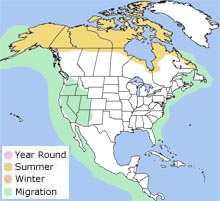 The red-necked phalarope breeds in Alaska and northern Canada. It migrates off of the Atlantic and Pacific coasts. It winters at sea in flocks off the coast of South America. The red-necked phalarope breeds in Alaska and northern Canada. It migrates off of the Atlantic and Pacific coasts. It winters at sea in flocks off the coast of South America.
Habitat
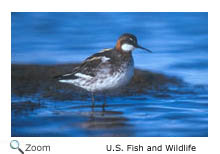 The red-necked phalarope breeds on tundra ponds. During migration, it is found on marshes, shores, and lakes. In the winter, it is found on the open ocean off the coast of South America. The red-necked phalarope breeds on tundra ponds. During migration, it is found on marshes, shores, and lakes. In the winter, it is found on the open ocean off the coast of South America.
. | |
Diet
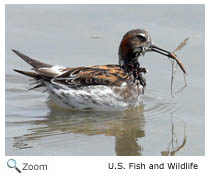 During the breeding season, the red-necked phalarope eats
insects,
crustaceans, and mollusks. The red-necked phalarope isn't built for diving, so on the ocean it
skims
zooplankton
and
small crustaceans and mollusks off of the surface of the water.
It is often found in areas where
ocean currents meet and create and an upswelling of water that brings food to the surface of the water.
Like the red phalarope, it also swims in circles to create whirlpools to bring food up to the water's surface. During the breeding season, the red-necked phalarope eats
insects,
crustaceans, and mollusks. The red-necked phalarope isn't built for diving, so on the ocean it
skims
zooplankton
and
small crustaceans and mollusks off of the surface of the water.
It is often found in areas where
ocean currents meet and create and an upswelling of water that brings food to the surface of the water.
Like the red phalarope, it also swims in circles to create whirlpools to bring food up to the water's surface.
Life Cycle
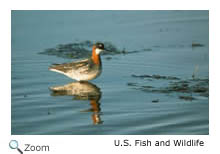 Like the red phalarope, the male and female red-necked phalarope switch traditional roles during breeding season! The female red-necked phalarope arrives at the breeding grounds first and establishes a breeding territory. She tries to attract a mate with a display flight. Both the male and the female create a scrape in the ground. The female picks the best one. The scrape is lined with lichen, moss, and grass. The female lays four eggs and then leaves. Sometimes she even tries to attract another mate and may have a second brood. The male incubates the eggs for 17-21 days and then cares for the chicks. The chicks are precocial and leave the nest and feed themselves shortly after hatching. The male stays with the chicks until they are two weeks old. The chicks fledge when they are
16-18
days old. Like the red phalarope, the male and female red-necked phalarope switch traditional roles during breeding season! The female red-necked phalarope arrives at the breeding grounds first and establishes a breeding territory. She tries to attract a mate with a display flight. Both the male and the female create a scrape in the ground. The female picks the best one. The scrape is lined with lichen, moss, and grass. The female lays four eggs and then leaves. Sometimes she even tries to attract another mate and may have a second brood. The male incubates the eggs for 17-21 days and then cares for the chicks. The chicks are precocial and leave the nest and feed themselves shortly after hatching. The male stays with the chicks until they are two weeks old. The chicks fledge when they are
16-18
days old.
Behavior 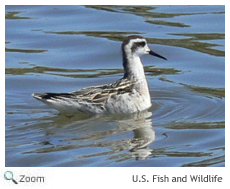 The red-necked phalarope
is a solitary bird in the winter, but in the summer it gathers in large flocks. The red-necked phalarope
is a solitary bird in the winter, but in the summer it gathers in large flocks.
|